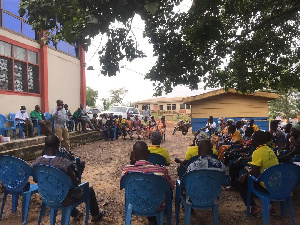The engagement is to help to enhance sustainable development of the oil palm sector Stakeholders in the Oil Palm chain have been engaged on how to enhance sustainable development of the oil palm sector through the introduction of a licensing regime to regulate their activities.
It will also ensure uniformity in the pricing of oil palm produce in the country to make the business attractive.
The engagement formed part of the Oil Palm Development Association of Ghana’s (OPDAG) efforts to ensure the well-being of the Ghana oil palm industry through mobilization, education, and implementation of policies to safeguard their activities.
It sought to enlighten participants on Best management practices, capacity building, provision of market information, and policy change interventions to the industry.
Mr Paul Amaning, the National Organizer of OPDAG, at a two-day visit to the Central Region as part of his nationwide tour, said OPDAG was a private sector industry association with a focus on promoting socially responsible, ecologically and economically sustainable production, value addition, and trading of oil palm in Ghana.
He explained that the mission of the OPDAG was to facilitate sustainable development of the oil palm sector through the provision of strategic advocacy, best management practices, capacity building, provision of market information, and policy change interventions to the industry.
Mr Amaning said establishing the oil Palm regulatory board would help enhance the operations of the sector to manufacture good palm oil that would attract market locally and internationally to boost the economy.
He revealed that Benso Oil Palm Plantation (BOPP) and the Twifo Oil Palm Plantations (TOPP) produced about 40,000 metric tonnes of palm oil annually, an indication that the oil palm industry had greatly improved in the Country over the past few years.
The National Organizer of OPDAG assured the stakeholders that the oil palm sector would be able to meet 60,000 metric tonnes of the product needed annually by the local market when well regulated and monitored.
He said it was sad that some importers reduced the price of their product after importing saturated oil labelled as crude oil palm into the Country and paying only five percent import duty instead of the 20 percent.
Mr Amaning said the activities of such importers were gradually collapsing oil palm plantations in the country as consumers always purchased cheaper products leading to factories not buying the plantations’ produce and called for stricter measures to forestall that nefarious practice.Mr Emmanuel Essel. a 34-year-old artisanal miller said […]
